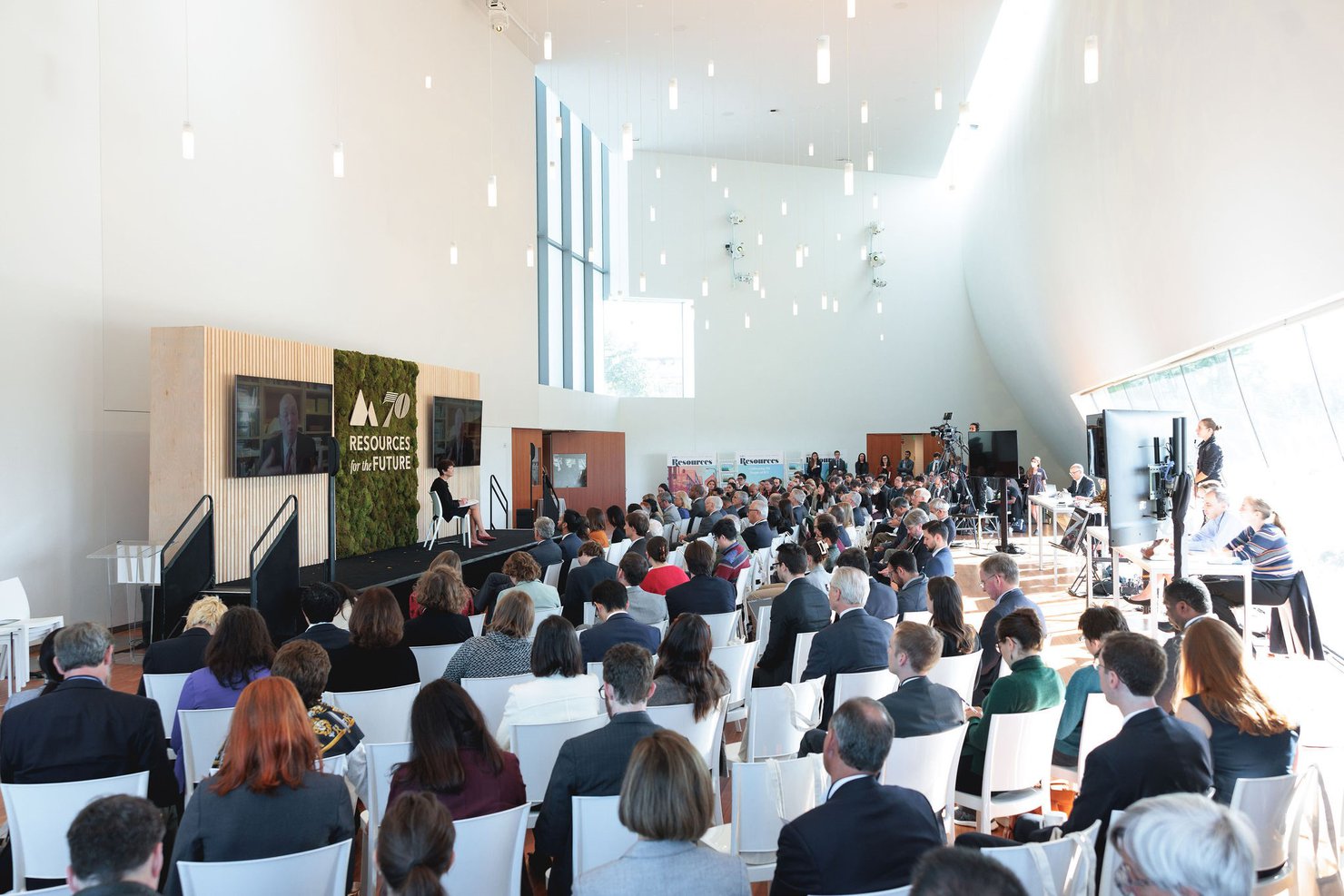2022 Annual Report
As Resources for the Future (RFF) worked to provide decisionmakers with the relevant research and policy analysis that they need in charting an effective, efficient, and equitable way forward, we also had a unique opportunity to reflect—to look back at our history and impact as we marked 70 years of work.
Overview
2022 was a year of both responsiveness and retrospection for Resources for the Future (RFF). Read more about our milestone year of impact and reflection in the 2022 Annual Report.
Letter from the President
As the Bipartisan Infrastructure Law passed in late 2021 and moved toward implementation in 2022, work on another historic climate policy package already was underway. In August 2022, the most comprehensive climate bill in US history was signed into law: The Inflation Reduction Act was introduced this summer by Senators Chuck Schumer and Joe Manchin, ultimately passing as law during the budget reconciliation process. Unlike any other major US environmental legislation to date, the Inflation Reduction Act relies heavily on “carrots”—financial incentives such as tax breaks that encourage moves toward clean energy technologies—rather than “sticks” in the form of mandates or fees.
With more than $360 billion targeted at reducing emissions and boosting domestic manufacturing and jobs, the law has far-reaching effects on a range of important advancements such as clean energy, energy efficiency, and electric vehicles. RFF scholars responded immediately to help inform the design of particular strategies and measure the potential impact across sectors, in collaborations that involved a diverse range of specialties. In doing so, our experts demonstrated RFF’s characteristic nimble nature and significant timely analysis that benefits both policymakers and the people those policies affect.
While Congress debated various provisions of the Inflation Reduction Act, and in the immediate wake of its passage, RFF released a wide-ranging set of analyses through timely events, reports, issue briefs, blog posts, and podcast episodes that explored the potential impacts of the new law’s provisions. Our scholars outlined the implications of the legislation for power-sector emissions and household electricity bills; electric vehicles in terms of subsidies, critical minerals, air quality, charging infrastructure, and the evolution of markets and the vehicle fleet; clean energy projects in “energy communities”; and a new approach to industrial-sector energy in the form of networks, or “hubs,” of clean hydrogen producers and users.

Amid this major milestone of climate legislation, RFF also marked our own milestone: 70 years of research, analysis, and policy engagement in pursuit of solutions that support both a healthy environment and a thriving economy.
October 2022 marked the 70th anniversary of RFF, an anniversary that has lent opportunities for celebration and reflection—an inflection point that called for an examination of how we got here and an exploration of the challenges that remain before us. The history of our incredible institution reveals critical lessons for today: RFF’s legacy demonstrates that drawing on ingenuity and innovation can help us surmount enormous problems, even on the magnitude of global climate change.
In the past seven decades, scholars at RFF have developed important techniques to evaluate the impacts of policy interventions for energy and the environment. We’ve also honed tools that can measure the benefits of environmental protection in economic terms, so those protections can be considered on equal footing alongside the costs of taking action. RFF scholars were the first to propose the unconventional idea that shaping market forces can help solve big environmental problems—and, in the process, created the fields of environmental economics and natural resource economics.
From its inception, RFF and its scholars have applied creative thinking, a willingness to set aside conventional wisdom, and an approach to policy that expands who and what can be part of the solution. Our organization has identified what motivates effective solutions, and our work has demonstrated how the very same economic forces that contributed to a problem also can be harnessed to fix it. We recognize that the best solutions for today may differ from the approaches that we’ve used with success in the past and from what we thought, just a few years ago, would be the strategies of choice. The best traditions of RFF produce ideas that might seem unconventional or untested—ideas that might fly in the face of conventional wisdom, but just may hold the key to our future.

This past October, RFF hosted the Net-Zero Economy Summit, a daylong convening to discuss the best strategies for driving emissions down to net zero. Conversations at the event examined the opportunities and challenges of delivering a net-zero resilient economy, with a nuanced emphasis on the system-wide transformations that are needed to create effective, efficient, and equitable solutions.
Net zero has become an increasingly salient goal for both governments and the private sector, because pursuing net-zero emissions focuses on an outcome that is subject to direct control, consistent with stabilizing the climate, inclusive of technology, open to innovation, and ready to harness the power of incentives. Furthermore, progress can be measured by whether actions are increasingly on a path to net-zero emissions—and this metric can be tracked at the level of the whole world, a nation, a state, or an individual business.

How can we possibly summarize the year of high-impact ideas that RFF produced in 2022? Certainly not in this letter, and not even in the few dozen pages that follow. We would need much more space to cover all the work and impact that RFF has achieved this year, but we’ve distilled the year’s accomplishments to some key moments. Please read on to share in RFF’s inquiries and insights that relate to a year of historic legislative action, a new estimate of the social cost of carbon, international trade and competitiveness, air pollution and public health, environmental justice, comprehensive decarbonization strategies, and much more.
As always—but especially in these critical times that call for rigorous research to help decisionmakers address the climate crisis—we thank our dedicated staff, partners, supporters, and Board of Directors. The impact described in these pages has grown from your continued commitment to RFF.
With many thanks,
Richard G. Newell
President and CEO
Resources for the Future
Our Year in Numbers

RFF was ranked #1 for environmental economics globally.

In 2022, RFF celebrated a landmark 70 years of advancing a healthy environment and thriving economy.

RFF is home to 139 staff and affiliated scholars.

RFF colleagues engaged in over 350 interactions with key policymakers and government officials.

We’re a 501(c)(3) nonprofit organization with a budget of $17,500,000 to support our work, our people, and our mission.

Our expertise was cited in the news more than 1,600 times by US and international news outlets.

Financial supporters of RFF include 268 foundations, corporations, individuals, and nongovernmental organizations.

RFF hosted more than 70 events, with over 12,700 attendees at our 28 public events alone.
Supporters
The generous resources provided by our supporters enables RFF to deliver the impact described in our Annual Report. Learn more about supporting RFF or find out about our supporters.

Financial Summary
In fiscal year 2022, RFF’s operating budget was $16 million, over 70 percent of which came from grants from foundations, governments, and other organizations, alongside individual and corporate contributions.
RFF’s operating budget in fiscal year 2023 is $17.5 million. RFF augments its operating revenue with net income from the RFF building and earnings from the RFF reserve fund. At the end of fiscal year 2022, the reserve fund was valued at $56 million.
RFF research and policy engagement represented 77 percent of total expenses in 2022. Management, administration, and development expenses combined were 15 percent of the total.
RFF’s audited financial statements, as well as detailed breakdowns of revenues and expenses, are posted on our website annually. These can be accessed at: www.rff.org/about/financial-reporting.
